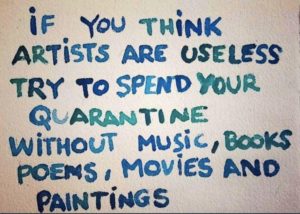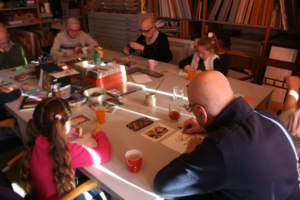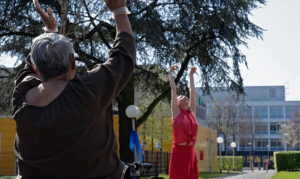What value does art (such as dance, drawing, music, song, poetry, theatre etc.) have on an individual, social and societal level? With the two year research project ‘Art for Senior Positive Health and Well-Being. Capturing the Impact of Art-based Initiatives and Programmes’ Leyden Academy and Amsterdam UMC look into the value of art in long-term care by describing existing art initiatives in care, evaluating the impact and looking for the underlying working principles.
 Background
Background
There is growing evidence for the positive impact of arts and culture on the health and social well-being of senior adults. Studies show that art-based interventions can have a positive effect on an individual, interpersonal, and societal level. Although the positive impact of art-based interventions on senior adults is widely assumed and supported nationally and internationally, the evidence for effectiveness is still fragmented. Moreover, there is a lack of appropriate research on and evaluation of the implementation of arts-based interventions for seniors. Filling these gaps, in this project, we will evaluate the impact, implementation, and continuation (sustainability) of 15 art-based initiatives and 4 arts-programs for older people in the Dutch long-term care setting.
Purpose
The goal of our research project is to promote active and meaningful participation among senior citizens by identifying, evaluating, and tailoring interventions that match their needs. Our approach is well-being driven and is based on the principles of Positive Health. Its main objectives are:
1) to evaluate art-based initiatives and arts-programs by applying (and refining) an Evaluation Framework for Art(s)-based Interventions that meet the needs of intended users (e.g., funders and policymakers) and simultaneously do justice to the artistic nature and local setting of the initiatives and programs.
2) to facilitate an action-learning process involving all stakeholders (e.g. senior adults, art instructors, professionals, policymakers, funders) to stimulate critical reflection on mechanisms of impact, actual impact, cost-benefit, and further implementation and continuation of initiatives (sustainability).
Methods
To gain a detailed and contextualized understanding of the meaning of art for positive health and insight into mechanisms of impact, impact itself, cost-benefit, implementation strategies, and continuation of arts-based interventions, we propose a responsive evaluation approach. This approach is responsive to and involves different stakeholders, and is action-oriented. Within the research project, we will foster dialogues among all stakeholders so that all can learn and reflect together on the mechanisms and actual impact of the arts-based initiatives/programs. We will use mixed-methods, including narrative inquiry using SenseMaker®, an innovative method in the field of long-term care to capture the meaning of art in short stories and quantifies impact fitting with the different evaluation goals. The core research team consists of a group of multi-disciplinary academics and a scholarly artist.  This artist knows what art-based interventions aim to do, and can help to use suitable methods to capture the artistic impact. Additionally, a co-research group of seniors will be involved in the entire research process from defining the research question to carrying out the research project together with the other team members. The active involvement of senior co-researchers ensures that the voices and perspectives of seniors are integrated into all phases of the research project. The scholarly artist together with the senior co-researcher will develop artworks capturing their observations and research findings on impact and mechanisms of impact, resulting in a tangible and experiential expression of the art-initiatives and arts-programs in an exhibition.
This artist knows what art-based interventions aim to do, and can help to use suitable methods to capture the artistic impact. Additionally, a co-research group of seniors will be involved in the entire research process from defining the research question to carrying out the research project together with the other team members. The active involvement of senior co-researchers ensures that the voices and perspectives of seniors are integrated into all phases of the research project. The scholarly artist together with the senior co-researcher will develop artworks capturing their observations and research findings on impact and mechanisms of impact, resulting in a tangible and experiential expression of the art-initiatives and arts-programs in an exhibition.
Knowledge dissemination
With our project, and together with others working within ‘Kunst en Cultuur in de Langdurige Zorg en ondersteuning (ZonMw)’ we aim to contribute to a comprehensive set of research, practice and policy guidelines and tools. The findings of our research project will be shared in a formal report, scientific and public articles, via texts, photographs, and movies online (website), and via presentations on (inter)national (scientific) conferences. Also, we will have a dialogue with a larger audience, supported by an art exhibition (to illuminate the meaning of the art) and digital storytelling (movie prepared by the scholarly artist in our team), on symposia and congresses (organized by others). To support seniors and art instructors, we will develop a guide to evaluate and improve an art-based intervention for and with seniors. As such, this project is a unique collaboration between researchers, artists, and seniors to study, distinguish, enhance and sustain the impact of art-based initiatives and arts-based programs.
 Results
Results
In August 2021, we published our findings in a special issue of scientific journal International Journal of Environmental Research and Public Health. Please click here for the open access article ‘The Value of Active Arts Engagement on Health and Well-Being of Older Adults: A Nation-Wide Participatory Study’. The research results demonstrate that arts engagement, according to participants, resulted in (1) positive feelings, (2) personal and artistic growth, and (3) increased meaningful social interactions. Our study concludes that art-based practices promote older people’s experienced well-being and increase the quality of life of older people. This study emphasizes the intrinsic value of arts engagement and has implications for research and evaluation of arts engagement.
For more information, please contact Lieke de Kock.